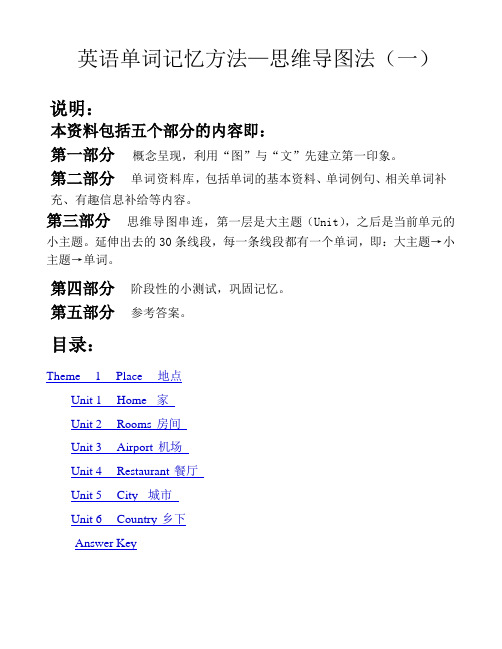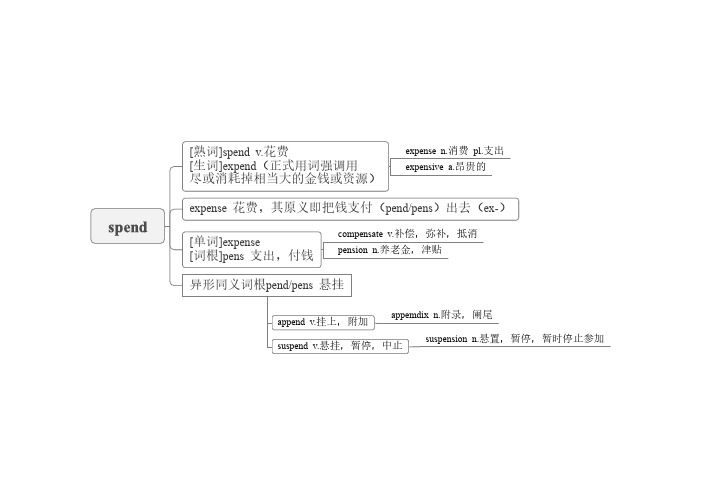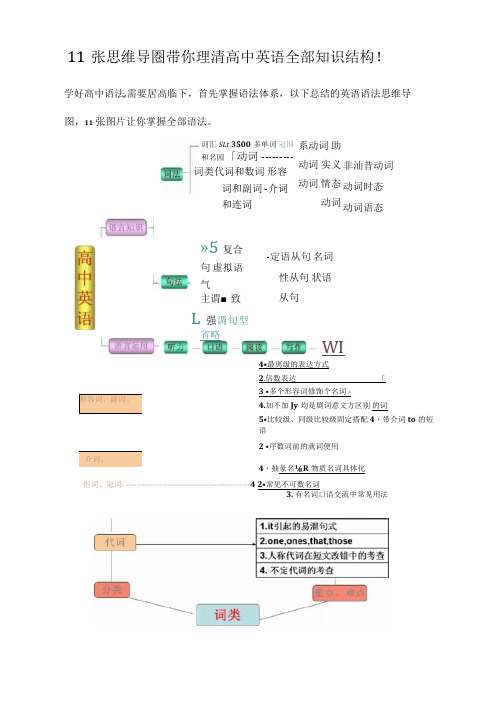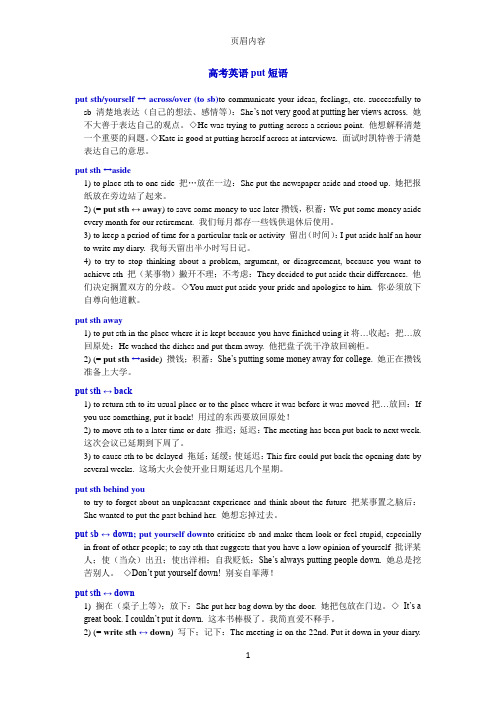英语put词组使用思维导图
人教版七年级下英语各单元主题思维导图

初中英语人教版七年级下
Unit2 What time do you go to school?
单元主题思维导图
Daily routines
日常作息习惯
对话篇 ng job Radio station What time…?
Scott:
12:00 —6:00
Interviewer: What time…get up?
Scott:
at 8:30
breakfast at 9:00
Interviewer: a funny time
Scott: Interviewer:
Scott:
exercise at 10:20
When do you go to work? 11:00/ never late for work
sports club
What…can you play?
soccer
join the soccer club
be good at tell story story telling club
like to draw
join two clubs
Let’s join now!
What can they do?
阅读篇 SectionB-2b
Place
The old people’s home The Student’s Sports Center
Requirements
Contact
Be free in July
Be _g_o__o_d_w__i_th__ old people
Can talk to them and play games with them
doesn’t like to get up early eating breakfast quickly having _h_a_m_b_u_r_g_e_r_s for lunch
人教版PEP英语五年级上册知识思维导图

人 教 版
1.—What would you like to eat? 你想吃什么? —A sandwich, please. 请给我一个三明治。 —What would you like to drink? 你想喝什么? —I’d like some water. 我想喝点水。 2. —What’s your favourite food? 你最喜欢吃什么食物? —Noodles. They are delicious. 面条。面条很好吃。 3. My/His /Her favourite food is fish. 我/他/她最喜欢的食物是鱼。 4. I’m hungry/thirsty. 我饿/渴了。 5. I don’t like beef but chicken is OK. 我不喜欢牛肉但是鸡肉也可以。 6. Onions are my favourite vegetable. 洋葱是我最喜欢的蔬菜。 7. I like vegetables but not carrots. 我喜欢吃蔬菜但不喜欢胡萝卜。 。
pronunciation
Language structure
Unit1 What’s he like?
n.
grammar
words
Adj
old 老的,年纪大的 young 年轻的,岁数不大的 funny 滑稽的,可笑的 kind 体贴的,慈祥的 strict 要求严格的,严厉的 polite 有礼貌的,客气的 shy 羞怯的,腼腆的,怕生的 helpful 有用的,愿意帮忙的 clever 聪明的,聪颖的 active 积极的、活跃的 quiet安静的;文静的 tall高的 short矮的
字母y在单词中的发音: 1、双音节或多音节词末发[ i ]: 例:baby happy windy sunny sorry andy many family party
八上英语思维导图1~8单元

以字母e结尾的词加-r fine-finer/wide-wider
形
规则
容
变化
重读闭音节词词尾只有一个辅音字 母时,双写该辅音字母,加-er
hot-hotter big-bigger
词
和
以“辅音字母+y”结尾的双音节词, early-earlier
副
变“y”为“I”,再加-er
happy-happier
… Tuesday?
…play tennis with friends…
阅读篇-SectionB-2b
What Do No.5 High School Students Do in Their Free Time?
exercise
Use the Internet
watch TV
We found that only… exercise every day…
Activities 活动
always, usually, often, sometimes, hardly ever, never, once, twice, one or two times a week, every day
Frequency 频率
Free time activities
Daily habits 日常习惯
初中英语人教版八年级上 Unit1 Where did you go on vacation?
单元主题思维导图
Rick and Helen talked about their vacations. 谈论假期活动
见面问候 Long time no see
介绍近况 旅游地点 旅游活动
on vacation
v.+ed v.+d y变i+ed 双写辅音
高考英语常用动词用法思维导图

高考英语常用动词用法思维导图例:1.Candles come in all shapes and sizes.有各种形状和大小的蜡烛。
2.I came across children sleeping under bridges.我偶然发现睡在桥下的孩子。
He spoke for a long time but his meaning didn’t really come across.他讲了很久,但并没有人真正理解他的意思。
3.When I came to,I was lying in a hospital bed.我醒来时躺在医院的病床上。
4.I’m afraid something urgent has come up.恐怕有紧急事情发生。
5.Her letter came as a complete surprise.万万没想到会收到她的信。
6.Check that the plug has not come loose.检查一下别让插头松脱了。
7.She had come to see the problem in a new light.她开始用新的角度来看待这个问题。
8.They may well regret the decision in years to come.他们很可能在以后的年月里会为这个决定后悔。
This is a moment that will be remembered for years to come.这一时刻将永远被铭记。
9.He is a bit of an expert when it comes to computers.他在计算机方面很在行。
10.How sad that all his hard work should come to nothing.他的所有辛勤劳动竟全部付诸东流,太让人伤心了。
例:1.—How did your interview go?—It went very well,thank you.”——你的面试情况如何?——非常顺利,谢谢。
思维导图破解高中英语语法 第2讲 句子类型

第二讲 句子类型
思维导图解析
简单句
翻译练习
1. 他从早到晚努力工作。 He works hard from moring to night. 2. 自从2010年以来成都发生了很大的变化。 Chengdu has changed a lot since 2020. 3. 比赛将于6月10日下午在我们学校礼堂举行。(2019全国2卷) The competition will take place in our school hall on the afternoon of June 10. 4. 我有很重要的事情去做。 We have something important to do. 5. 老师在教室的墙上贴了一些照片。 The teacher put up some photos on the wall of the classroom. 6. 我相信你将会在这里度过一个愉快的假期。 I believe that you will have a pleasant holliday. 7. 地震期间你应保持冷静。 You should keep calm during the earthquake.
翻译练习
8. 麦克去年成为一名职业篮球运动员。 Mike became a prossional football player last year. 9. 我们报纸的“外国文化”栏目非常受我们学生的欢迎。(2016全国1卷) The “Foreign culture” section in our newspaper is very popular among us students. 10. 他向我们提供了大量的食物和水。 He offered us plenty of food and water. 11. 我妈妈给我做了顿大餐来庆祝我的胜利。 My mom cooked me a big meal to celebrate my victory. 12. 你上次给我展示过一些有关这个主题的照片。(2016全国2卷) You showed us some photos about the theme. 13. 网络使学习容易又方便。 The Internet makes study easy and convenient. 14. 这次展览会帮助你更好理解中国传统绘画。 The exhibition will help you have a better understanding of traditional Chinese painting. 15. 我认为写英语日记很有用。 I think it useful to keep an English diary. =I think (that) it is useful to keep an English diary.
英语知识点思维导图(冀教版四年级下册)--建议用A0纸打印

Where do/does + 主语 + live ?--主语 + live/lives + 介词 + 地点 + 其他W here do you live?W here does your grandpa live?What's one's address?--One's address is + 具体位置.--具体位置.W hat is your address?M y address is 35 Xinhua Street.英认某地是否在另一地点附近Is that near + 地点?--Yes./No.e too.I like playing football.M e too.t oo 还有“过于、太“的意思T he coat is too big for me.How do you go (to) + 地点?--I go (to) + 地点 + 出行方式.How do you go to the park?--I go to the park on foot.How do you go to there?--I go there by subway.g o 后面跟t rain s hip b ike p lane s ubway b us ake a car a bus t he subway t he rain ide a bike a horse f oot D o you + 动词原形 + 其他?D o you go to school by bus?Y es,I do.喜欢做某事H e likes to eat bananas.喜欢做某事,常表示爱好W e like playing chess.喜欢某人或某物I like this map.hat do/does sb. like to do?-Sb. like/likes to 动词原形(+ 其W hat do you like to do?I like to fly kites.hat's your favourite colour?-My favourite colour is ...-... is my favourite colour./i:/ 长元音s ea teacher /e/ 短元音h eavy ready 千位t housand短语i n front of i n the front of 区别在于包含关系on in behind above beside under near b etween 区分beside 与near 区分between 与among b e (助)动词a m is are 一般动词put do play read fly drink listen clean sit wash swim write ride come l ive t eacher name pupil friend crayon blackboard desk chair metre 组合词s choolbag birthday 短语名词p encil box p encil case 月星颜c olour食f oods ubject意思“和,与”,表示并列或承接在三个及以上的单词或短语时,一般在最后两个之间加andM r. 某先生M rs. 某女士M iss 某小姐。
英语单词记忆方法—思维导图法(一)

英语单词记忆方法—思维导图法(一)说明:本资料包括五个部分的内容即:第一部分概念呈现,利用“图”与“文”先建立第一印象。
第二部分单词资料库,包括单词的基本资料、单词例句、相关单词补充、有趣信息补给等内容。
第三部分思维导图串连,第一层是大主题(Unit),之后是当前单元的小主题。
延伸出去的30条线段,每一条线段都有一个单词,即:大主题→小主题→单词。
第四部分阶段性的小测试,巩固记忆。
第五部分参考答案。
目录:Theme 1 Place 地点Unit 1 Home 家Unit 2 Rooms 房间Unit 3 Airport 机场Unit 4 Restaurant 餐厅Unit 5 City 城市Unit 6 Country 乡下Answer KeyTheme 1 Place 地点Unit 1 Home 家1address/əˈdres/n. 地址;演说;谈吐•There isn't enough space for my address. 这里没有足够的空间写我的住址。
•change one's address 变更某人的地址•tell me your address 告诉我你的地址2location/ləuˈkeiʃən/n. 定位,测位;测量•First, we must decide on the location of our new swimming pool. 我们得先给新游泳池选个地点。
•Mr. Huang's company is going to move to a new location. 黄先生的公司将要搬到一个新的地点。
3habitation/ˌhæbiˈteiʃən/ n.居住,住所•We think this house is unfit for human habitation,so we have decided to move. 我们觉得这房子不适合人居住,所以我们决定要搬走。
人教版九年级英语各单元主题思维导图(1-10)

It‘s important to learn how to use the right language in different situations. This will help you communicate better with other people.
Getting around
初中英语人教版九年级全一册
Unit3 Could you please tell me where the restrooms are?
单元主题思维导图
阅读篇-Section B 2b
How to ask for help politely
In different situations, choose and use suitable language based on.
阅读篇-Section B 2b
The Spirit of Cng love and joy
The Best Example: A Christmas Carol (a novel by Charles Dickens)
three ghosts 1. the Ghost of... Past 2. the Ghost of... Present 3. the Ghost of... Yet to Come
...
初中英语人教版九年级全一册
Unit2 I think that mooncakes are delicious!
单元主题思维导图
Jacob Marley
In the past, 1. mean 2. not treat others nicely 3. just care about making more money, hate Christmas
高考英语高频500词记忆思维导图

[词根]amb(i) = go 奔走,走动y-icalbiology n.生物(学)biological a. ecology n.生态(学)ecological a. psychology n.心理(学)sociology n.社会(学)zoology n.动物(学)secure a.安全的;牢固的 v.使安全。
保卫;取得,获得force n.强迫,迫使form n.形式v.(使)组成n.一群,一伙band[]str(o)y struct教育,指导;指示;命令;告知agriculture)是在田野()是在室内([]mid[]went→[]ven(t)impress vt.留下印象,使铭记↔]tect(建筑)architect n.建筑师;设计师请求,要求;需要(问,求)require v.需要,要求requirement n.需要,要求[词根]quarquarrel v.争吵,吵架enquire 、inquire v.打听,询问enquiry 、inquiry n.打听,询问acquire v.获得,学得(问,求)acquisition n.获得(物),增添的人,取得,获得,习得一个坚持:insist两个命令:order;command 两个决定:decide;determine三个建议:suggest;advice;propose 四个要求:demand;request;require;ask[单词]servant → [词根]serv 保存verse)成的uni)缩写opposite n./a.对面(的);相反(的)提议,建议;打算,计划;求婚。
11张思维导图带你理清高中英语全部知识结构!

4•最离级的表达方式 2.倍数表达「3 •多个形容词修饰个名词 -4.加不加Jy 均是剧词意文方区别 的词5•比较级、同级比较级固定搭配 4・带介词to 的短语2 •序数词前的就词便用11张思维导圏带你理清高中英语全部知识结构!学好高中语法,需要居高临下,首先掌握语法体系,以下总结的英语语法思维导 图,11张图片让你掌握全部语法。
诃汇SLt 3500多单诃 冠国和名园 「动词 --------- 词类代词和数词 形容词和副词 -介词和连词 系动词 助动词 实义动词 情态动词 非汕昔动词 动词时态 动词语态 »5 复合句 虚拟语气主谓■致L强调旬型省略-定语从句 名词性从句 状语从句WI4・抽彖名⅛R 物质名词具体化侶词、冠词: ------------------------------------------------ 4 2•常见不可数名词3. 有名词口语交流中常见用法形容词、副词、介词、动词时态动词语态虚拟吾气]情杰动词非谓语动词—般式被动式进行式完成式to do (not) to do (not) to be done (not) to be doing (not) to have doneV-Ing(not) doing (not) being done (not) having done done (not) done主语宾语状语定语补足语农语插入语to do**to make matters worse, toPUt it mildly, to toll thetruth, generally SPeaking,COnSidering, allowing for,judging fromV-ing **done **1非谓语动词作状语与独立主格结构、状语从句的区分。
__________________________________ 2非谓语动词作定语。
3 With复合结构和as引导的状语从句的区别。
高一英语必修一_Unit4_Learning_about_Language_词汇导图语境速记

frightening
frighten vt. 使惊吓;使惊恐 frighten sb. into doing sth. 把某人吓得做某事
frightening adj. 令人恐惧的
考 高 佳句
(2017课标全国Ⅱ阅读理解D)Scientists have found that all kinds of plants give out VOCs when being attacked. 科学家们发现,各种各样的植物在受到攻击时都会散发出挥发性有 机物。
短语辨析
give out/run out/ use up ①give out 含有“耗尽,筋疲力尽”之意,是不及物动词 短语,有时可与run out互换。 ②run out 意为“用完,耗尽”,是不及物动词短语,常 用物作主语。 ③use up 意为“用完,耗尽”,是及物动词短语,常用人 作主语。
高中英语人教版 必修一 Unit4 Earthquakes
Learning about Language
词汇导图语境速记
有关use的 短语
of great/ little use 很有用/用处不大的 in use 在使用中 It's no use doing sth. 做某事没用 come into use 开始使用 make good/ full use of 充分利用 put sth. to use 利用某事物
of no use 相当于useless,表示“无用的”。
漫画助记
Make full use of every chance to speak English. 要充分利用每一个机会说英语。
高考英语put短语汇总

高考英语put短语put sth/yourself ↔ across/over (to sb)to communicate your ideas, feelings, etc. successfully to sb 清楚地表达(自己的想法、感情等):She’s not very good at putting her views across. 她不大善于表达自己的观点。
◇He was trying to putting across a serious point. 他想解释清楚一个重要的问题。
◇Kate is good at putting herself across at interviews. 面试时凯特善于清楚表达自己的意思。
put sth ↔aside1) to place sth to one side 把…放在一边:She put the newspaper aside and stood up. 她把报纸放在旁边站了起来。
2) (= put sth ↔ away) to save some money to use later攒钱,积蓄:We put some money aside every month for our retirement. 我们每月都存一些钱供退休后使用。
3) to keep a period of time for a particular task or activity 留出(时间):I put aside half an hour to write my diary. 我每天留出半小时写日记。
4) to try to stop thinking about a problem, argument, or disagreement, because you want to achieve sth 把(某事物)撇开不理;不考虑:They decided to put aside their differences. 他们决定搁置双方的分歧。
